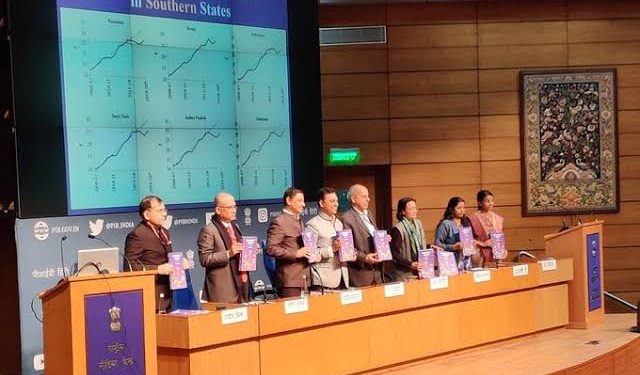- Survey shows a growth of 3.4 % in both Q1 and Q2 (quarter 1 and quarter 2)” in agri sector
- Only sector to contribute to the growth of GVA in both quarters
- Recommends increasing the cost at which food is sold to the poor under NFSA
TAD NewsDesk, New Delhi: The recent Budget-eve Economic Survey 2020-21 is facing heat as it supported the three agricultural laws. The contentious laws which have encountered the flak of farmers were described as a “remedy, not malady”. Further, the report also gave comprehensive explanations as to why the laws are needed and made an economic case for it.
The survey indicated that agriculture is “set to cushion the shock of the Covid-19 pandemic on the Indian economy in 2020-21 with a growth of 3.4 % in both Q1 and Q2 (quarter 1 and quarter 2)”.
“It is the only sector that has contributed positively to the overall Gross Value Added (GVA) in both Q1 and Q2 2020-21,” the survey added.
However, the recommendation that is expected to earn criticism from beneficiaries is the Survey’s proposal to raise the price at which the government sells cheap food to the poor amidst rising costs of buying, storing and distributing food under the public distribution system. According to the provision found under the National Food Security Act, 800 million Indians receive grains at subsidized prices of ₹3, ₹2 and ₹1 per kg per person per month for rice, wheat and coarse grains.
The Economic Survey is a document that presents the state of the economy on the eve of the Union Budget. Over the last few years, it has become a platform for deliberating on economic issues and coming up with possible solutions.
Authored by the government’s chief economic adviser, Krishnamurthy Venkata Subramanian, the survey seems to defend the Centre approved farm laws that have faced agitation from farmers. Contrary to popular opinion, the survey claims that agricultural law aims to “remedy” the inefficiencies of the farm sector.
“There is a need for a paradigm shift in how we view agriculture from a rural livelihood sector to a modern business enterprise,” the survey stated.
“Agricultural produce market committee regulations have resulted in a number of inefficiencies and consequent loss to the farmers. Presence of multiple intermediaries between farmers and final consumers has led to low realisation by farmers”.
Highlighting that a majority of taxes and cesses levied by state-run mandis, the survey states that the regulated markets have “cut into farmers’ price realisation and poor infrastructure at the mandis compounds the problems”.
Additionally, the survey said in the favour of farm laws that the postponement in selling perishable produce at markets due to lack of modern sorting and grading facilities leads to post-harvest losses of up to 4-6% in cereals and pulses, 7-12% in vegetables and 6-18% in fruits.
On the new contracting farm law that has faced criticism, the Economic Survey stated, “Farmers have been provided adequate protection as sale, lease or mortgage of farmers’ land is totally prohibited and farmers’ land is also protected against any recovery”.
“The survey makes a strong case for the farm laws in a bid to make them acceptable, but rather than economic rationale, only political outreach can achieve that objective now,” said Arunim Saikia, an economist with the North Eastern Hill University.
Contradicting the findings of the survey, the agitating farmer unions have claimed that the law is favourable to corporations and could jeopardise farmers’ land titles.
Since November, farmers have been leading protests demanding a repeal of the three laws—Farmers (Empowerment and Protection) Agreement on Price Assurance and Farm Services Act, 2020, and Farmers’ Produce Trade and Commerce (Promotion and Facilitation) Act, 2020 and Farm Services and the Essential Commodities (Amendment) Act, 2020.
While the government claims that the contentious laws aim to ease restrictions on the trade of farm produce by setting up free markets, the farmers claim that it will destroy the system of APmC mandis and make them vulnerable to exploitation by huge corporations. They have added that the system of free markets under the “reform” laws will erode their bargaining power and weaken the system of MSP guaranteed to farmer and make them vulnerable to exploitation by corporate giants.
Source – Hindustan Times










